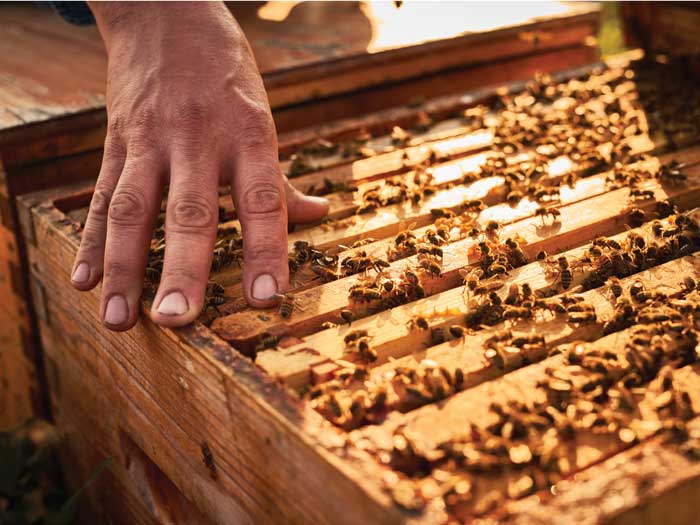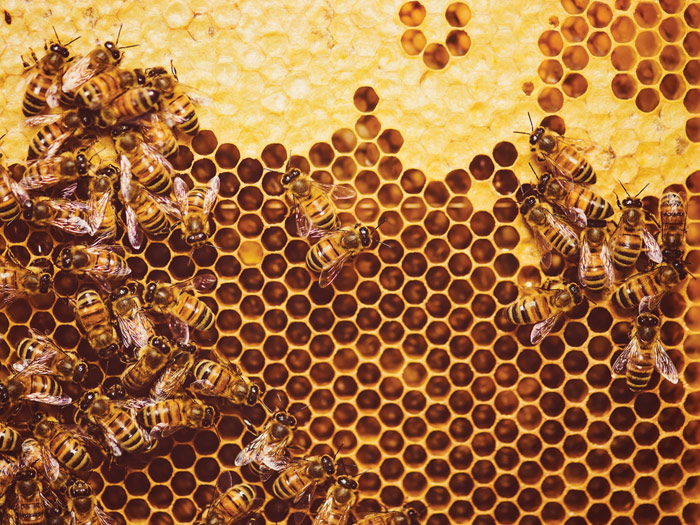The CPA who’s making a buzz in the beekeeping biz
 Anicet Desrochers and Anne-Virginie Schmidt (Photograph by Daphne Caron)
Anicet Desrochers and Anne-Virginie Schmidt (Photograph by Daphne Caron)
Every weekend, the highways leading north out of Montreal clog with traffic as downtowners flee for the hills. The swarm of vehicles begins to subside just beyond the city limits, as the landscape gently transforms into the lakes, forests and mountains of the Laurentians. By Mont-Tremblant, most motorists have already made their escape, and the highway gives way to country roads and, eventually, gravel lanes.
Along one of those dusty routes, nearly three hours north of the city, urban runaways will discover a sweeter hum and bustle than the kind they left behind. Located in the tiny rural community of Ferme-Neuve, Miels d’Anicet is a modestly sized apiary that’s home to some 70 or 80 million honeybees, as well as two innovative beekeepers. Anne-Virginie Schmidt, 42, and Anicet Desrochers, 40, joined forces 18 years ago, first as a couple and then as business partners. Their operation, once a humble 100-hive project, now has 1,200 hives, as well as an on-site store and restaurant for the 18,000 visitors who make the pilgrimage every year.
On a brisk day this past fall, not long after the bees had been packed away for their winter hibernation, the apiary’s main building was still buzzing with activity. Staff—15 to 40 employees, depending on the season—were busily crisscrossing, carrying out some of the operation’s daily tasks: running the shop, organizing the storeroom, filling jars of honey, baking honey-spiced goods, making honey-based cosmetics, going over the accounts. Schmidt was working in her small office, which overlooks a plain that blooms with wildflowers all summer long. Somewhere between an executive and a matriarch, she exuded warmth and competence as she laughed, joked and pitched questions and suggestions to her employees.
 The Pollens
& Nectars Canteen (Photograph by Daphne Caron)
The Pollens
& Nectars Canteen (Photograph by Daphne Caron)
Schmidt and Desrochers met in their early 20s. Schmidt, a professional accountant, was working as an auditor at KPMG’s downtown Montreal office, where she had built a reputation as an ambitious youngster who was able to handle important accounts and operate independently. She led a hard-driving corporate lifestyle, often putting in 60-hour weeks—and she loved it. But she wanted more—namely, to run her own business. “I was putting in so much energy and time for my clients,” she says. “I thought, if I do the same thing for my own business, I think it could be a success.”
Ever since she was a child, Schmidt had dreamed of becoming an entrepreneur like her parents, who owned an architecture firm, and both sets of grandparents, who ran a 30-room inn and restaurant (on her father’s side) and a school bus company (on her mother’s side). Lacking a particular business idea, she decided to develop general skills like finance and accounting that would serve her when the right opportunity arose. “I wanted to have as many tools as I could,” she says of the decision to become an accountant. When the perfect business idea made itself known, she would be ready.
“I took the challenge [of being a CPA], and I reproduced it in my business. I didn’t want to just be a beekeeper—I wanted to be the best beekeeper.”
That brilliant idea finally appeared in the form of Desrochers, a charming oddball with a crooked grin, a tangle of brown hair and a passion for beekeeping. Desrochers was practically raised by bees: his parents were part of a movement of Quebec hippies who emigrated to the Upper Laurentians in the 1970s. They kept 100 beehives for making mead, or honey wine, which they mostly sold to local markets and eventually to the Société des alcools du Québec (SAQ). By 2000, when Schmidt’s brother introduced the pair, Desrochers had moved back home to take over his parents’ beekeeping operation.
Schmidt fell in love with the man first and the bees second. When Desrochers first opened a hive for her, she says she immediately grasped his intense passion for bees. “In perpetual motion, all those vibrating bodies constitute an essential link in the life of humans, a link that colours and fills our plates,” she would later write of that moment in the foreword to her book, Le Miel: L’art des abeilles, l’or de la ruche, which is part memoir, part cookbook and part bee bible.
Schmidt’s weekend visits to the farm evolved into informal professional consultations. In 2002, she left KPMG and joined Desrochers as a full partner, in business and in life. Desrochers had the project and the technical beekeeping skills, while Schmidt had the business management savvy. “We don’t come from the same world,” she says. “We clash a bit, but together, we’re really strong.
 Miels d’Anicet is a modestly sized apiary that’s home to some 70 or 80 million honeybees (Photograph by Daphne Caron)
Miels d’Anicet is a modestly sized apiary that’s home to some 70 or 80 million honeybees (Photograph by Daphne Caron)
Schmidt left behind the corporate life, but she didn’t abandon her ambition. The couple set out to create a market that understood the unique value of their product. “From the beginning, that was the only line we wanted to follow,” she says. “I took the challenge [of being a CPA], and I reproduced it in my business. I didn’t want to just be a beekeeper—I wanted to be the best beekeeper.”
Miels d’Anicet’s approach to apiculture blends the ancient and modern. In her book, Schmidt delves into beekeeping’s deep history. The Egyptians claimed the innovation 4,700 years ago, spinning out such applications as fermented beverages, antiseptic treatment and embalming (not to mention nourishing the gods). In the Middle Ages, bees gained popularity as an insect with Christian values. They were celebrated for their purity, wisdom and virginity.
Today, there are more than 10,000 beekeepers across Canada, who produce $188 million in honey every year (up significantly from $63 million in 2005). More than 80 per cent of that honey comes from the Prairie provinces, where bees do double duty as honey producers and pollinators for crop production. More than two-thirds of Canada’s honey gets exported to the U.S., sold in bulk to large brands like Billy Bee and Doyon.
Miels d’Anicet is unique in that it packages, markets and sells all its honey independently. It also breeds and sells queen bees to other apiarists around the world. Raising queens is a difficult but potentially lucrative practice that requires specialist skills, like collecting eggs from the best hives, grafting larva to new cells and raising young queens in special hives. From the beginning, Desrochers wanted to raise queens adapted to Canada’s northern climate and sell them, for example, to prairie beekeepers to pollinate their canola, sunflower and soybeans. But in order to create a queen-breeding centre, Desrochers and Schmidt had to grow the number of hives. More hives meant more honey, and that meant selling to more markets.
Schmidt devised a foodie-friendly brand for the honey. “The business became trendy, because we were, like, cool hipster beekeepers.”
To differentiate Miels d’Anicet honey, Schmidt made sure they met the requirements for organic certification. Their honey travels pretty much straight from hive to jar, where it gradually crystallizes. The pure, raw stuff thickens and solidifies, unlike the clear, runny pasteurized honey that lasts longer on supermarket shelves. “Pasteurized honey isn’t real honey, from my point of view,” says Schmidt. “You lose all the flavour. The flavour comes from essential oils from the flower. If you heat it too much, the oil evaporates.”
Miels d’Anicet honey, Schmidt argues, is wilder and tastier. Connoisseurs can taste the effect of industrial mono-cropping on the quality of honey: if the bees eat only clover or cornflower, the honey’s flavour range is diminished. The general public has less discerning taste buds, so Desrochers and Schmidt found they needed to teach customers how to appreciate high-quality honey—the apiary’s main foyer, for instance, is dedicated to honey-schooling customers, with a museum-style installation and sampling counter. Honey in June doesn’t taste like the honey in July, which doesn’t taste like the honey in August.
 Miels d’Anicet, once a humble 100-hive project, now has 1,200 hives (Photograph by Daphne Caron)
Miels d’Anicet, once a humble 100-hive project, now has 1,200 hives (Photograph by Daphne Caron)
Schmidt also devised a designer honey brand that would appeal to foodies, and grew that brand by getting their honey in the kitchens of fashionable restaurants like Joe Beef, the world-renowned Montreal eatery. They now sell their honey in 200 stores and to 50 different restaurants, including high-end Montreal spots like Toqué! and Nora Gray. “The business became trendy, because we were, like, cool hipster beekeepers,” explains Schmidt.
The artisan strategy is working. Between 2000 and 2015, Miels d’Anicet’s sales grew by nearly 50 per cent every year; they started with $20,000 in annual sales and now hit more than $2 million. “It’s a lot of growth to manage, because you always need more money,” she says. As production grows, the sales department grows, and in turn the HR department grows, and so on. “All of those departments need procedures, internal control, investment, communication protocols, training.” Rather than contract any part of their business to third-party vendors, “we do everything ourselves.”
Schmidt says her training as an auditor is part of what makes that possible. At KPMG, she developed a detailed understanding of businesses in disparate fields, including forestry, film and TV, and oil and gas. She could see the big picture and maintain a granular awareness of nitpicky details—something that served her well on the farm. “You can visualize all the steps that you need to put into action,” she says.
She also knew which loans and agricultural subsidies to apply for as she was building the operation. “Business-wise, as a CPA, I could easily understand all the programs that were available,” she says. Many farmers struggle to construct a compelling business case—building a budget, explaining costs, presenting advantages and disadvantages—but Schmidt knew exactly what she was doing. Her designation, she says, gave Miels d’Anicet more credibility among government bodies, which made the process even smoother.
Since direct sales offer better margins than online orders, Schmidt and Desrochers opened a restaurant at the farm.
Schmidt also brought risk-management expertise to her new profession. Beekeeping is getting harder. Many variables can make for a bad year: pesticides, mites, parasites and, most of all, climate change. Miels d’Anicet can produce 160,000 pounds of honey one year and only 80,000 pounds the next, based solely on differences in the weather. As climate change makes weather patterns more erratic and unpredictable—and alters which flowers grow when—these risks are only getting more severe. If it’s too wet or too dry, the bees can’t collect. With the variable weather we see now, each year is a new scenario. “It’s more difficult than it was 30 years ago to maintain bees,” she says.
To manage the risks of honey production, Schmidt decided she and Desrochers needed to diversify their revenue. Apart from honey and queen bees, she added an organic skincare line named Mélia, after their daughter. Working out of a rustic, kitchen-like laboratory, they make soaps, ointments, body butter and other products, each with honey, beeswax or propolis (a resin bees make to seal off parts of the hive). They also expanded into food products, like honey-flavoured spice bread and honey-seasoned jams and mustards.
Schmidt also used her skill set to establish margins and calculate the true costs of products. It was up to her to make a go-to-market strategy: how much they needed to sell to retailers and to customers, on their own website or in person (Miels d’Anicet honey is available in select supermarkets). Since direct sales offer better margins than online orders, Schmidt and Desrochers opened a restaurant at the farm, called the Pollens & Nectars Canteen, to attract more in-person customers and further diversify.
 Between 2000 and 2015, Miels d’Anicet’s sales grew by nearly 50 per cent every year (Photograph by Daphne Caron)
Between 2000 and 2015, Miels d’Anicet’s sales grew by nearly 50 per cent every year (Photograph by Daphne Caron)
With the restaurant, Schmidt and Desrochers are cashing in on Quebec’s booming agri-tourism and gourmet tourism industry, which was worth $485 million in 2015. More and more people are quitting the cities on weekends to pick apples and buy pumpkins directly from farmers. Like Miels d’Anicet, many Quebec farms are repositioning themselves as travel destinations; the agri-tourism industry has seen greater growth than any other type of tourism in the province.
Schmidt acknowledges it won’t be easy for Miels d’Anicet to stand out from the scores of farms peddling artisanal wares and pastoral authenticity. For venturesome urbanites to drive three hours north and navigate country roads, the pull needs to be particularly strong. “Bringing customers to the end of a gravel road is hard,” says Schmidt. “You have to build your brand and become an attraction.”